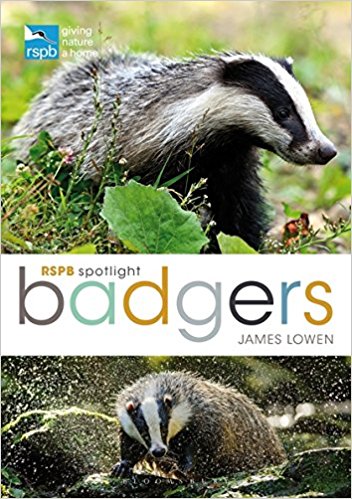Advice to Farmers
| RSPB Spotlight on Badgers book |
 |
James
Lowen explores the lives of badgers and their communal
living, feeding habits and threats to their conservation. Click
here to buy:
Paperback edition
Kindle edition
|
Just in case whether you are wondering who "Badgerland" are, and
who we represent, details of our farming policies are described on our Farming
Policy page.
|
"The world of badgers is in some ways analogous with the
human world. Like us, their behaviour is greatly influenced by their need for
homes and living space, and being social like we are, they too have their
problems of learning how to live together ..... and with us" |
|
Ernest Neal
|
Almost since 1971, when a badger was discovered to be suffering with TB,
badgers have been blamed for giving TB to cattle. Of course, TB existed in
cattle for at least 2000 years before 1971. Irrespective as to whether badgers
give TB to cattle or not, badgers are NOT the only source of TB infections in
cattle. Other culprits could also be cats, rats, water voles, deer, and, of course, other
cattle.
It's also worth noting that some members of the National Farmers Union (NFU)
want to see badgers exterminated across whole sections of countryside as a
"precaution". It's worth remembering that as at August 2003, there is no
scientifically-validated proof that badgers give TB to cattle. In addition, many
badger scientists believe that the primary infection route between badgers is
from mothers to cubs. Research has shown that the most mobile badgers may be
females and young males - very possibly the ones with the greatest likelihood of
being infected with TB. As a farmer, you might not be very pleased to find out
that as well as a negative publicity of having exterminated all the badgers on
your land, it turned out that they did not have TB anyway. Imagine your shock,
therefore, to find a couple of years later that the newly-arrived badgers
brought TB with them. You might then wish that you hadn't agreed to kill the
first lot of badgers in the first place.
Despite the announcements by the NFU that they are an organisation which
represents farmers, we think the BSE and Foot-and-Mouth crises should set alarm
bells ringing as to whether the NFU do, in fact, provide farmers with any
overall positive benefit at all. This news article from the 22nd Jul 2003
(Private Eye), suggests the NFU may not, in reality, be quite as popular
with farmers as their leadership might once have thought.
Of course, no-one, apart from perhaps a few extreme badger-hating nutcases,
believe that badgers are the only animals which give TB to cattle. Even if you
killed every badger in the entire country, TB would still exist within other
wildlife species. Even if you wanted to kill every cat, rat, water-vole, deer and
cat; you could not achieve it anyway. But, even if you did, bovine TB would
still remain within the cattle population, and cattle would still give TB to one
another.
Here at Badgerland, we hope and pray that badgers do not give bovine Tuberculosis (bTB) to
cattle.As at August 2003, we believe that badgers do not give TB to cattle, except
in the most extreme "laboratory" conditions. However, for far too
long we have been waiting for DEFRA
to publish some scientifically-valid results. Until they do,
we can not rule out the possibility that badgers (and other wildlife) might
give TB to cattle.
Irrespective, what the pro-badger (e.g. NFBG) or and anti-badger lobby (e.g.
NFU) might say about the connection between badgers, cattle and bovine TB;
farmers have the difficult job of running their farms. Whatever the personal
beliefs of the scientists or the terminological inexactitude of the spin-doctors, the truth is
that the science is not yet known. Eventually, the truth will be discovered; but
until then bovine TB remains a risk-management issue for farmers.
In these uncertain circumstances, it makes 100% pragmatic sense that farmers follow a well-defined risk
assessment to mitigate against the risks of a TB Breakdown in their herd.
In answer to the question "why should I make the effort to stop TB in my
herd?", look at the following article entitled: Costs of a TB Infection in a Dairy Herd.
Reviewing those figures, we would then recommend that you study the article
entitled: Reducing the risk of cattle getting TB.
Whilst this is a Badgerland document, it is heavily based on advice given out by
well-regarded scientists at MAFF (as it was then) and DEFRA.
Following this advice is not guaranteed to prevent you getting TB in your herd, but it will
reduce the risks of an infection very considerably.

| Legal Notice regarding the banning of
Renardine: |
| Renardine was the only legally permitted chemical deterrent which was
effective against badgers.
As from the 24th March 2005, Renardine has been banned.
Importantly, ALL the approvals for Renardine have now expired. This
means that: |
|
* Renardine can no longer be advertised for sale. |
|
* Renardine can not be bought from any shop, wholesaler, mail order,
agricultural supplies merchants, internet or by private sale. |
|
* Renardine may no longer be supplied, sold, given away or swapped. |
|
* Renardine may no longer by used. |
|
* Renardine may no longer be stored (so any stocks you have must be
disposed of). |
|
RenCoco
( Renardine-impregnated cocoa shells) has also been banned. |
|
For more information see the
PSD's web site at http://www.pesticides.gov.uk/approvals.asp?id=1567 |
|
